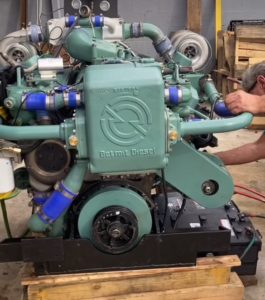
Introduction
The Detroit Diesel 8V92 marine engine is one of the most iconic and enduring engines in maritime history. As part of the 92 Series, this V8 engine delivered exceptional power, reliability, and versatility, becoming a staple for marine operators worldwide. With multiple configurations, including non-turbo, turbocharged, intercooled, and turbo-aftercooled models, the 8V92 was adaptable to a wide variety of marine applications, from fishing vessels to tugboats and luxury yachts.
In this article, we’ll explore the history, specifications, and various configurations of the Detroit Diesel 8V92, along with its applications and ongoing relevance today.
History of the Detroit Diesel 8V92

The Detroit Diesel 92 Series was introduced in the 1970s as an evolution of the widely successful 71 Series. The 8V92, with its V8 design and larger displacement, quickly became known for its robust performance and ability to handle demanding workloads.
Key Historical Milestones:
- 1974: Launch of the 92 Series, featuring the 8V92 as a high-power V8 solution.
- 1980s: Widely adopted in the marine industry for both commercial and recreational vessels.
- 1990s: Continued enhancements to meet efficiency and emissions standards, further cementing its legacy.
The engine’s modular design, ease of maintenance, and high power-to-weight ratio contributed to its reputation as a durable and versatile marine engine.
Technical Specifications
The Detroit Diesel 8V92 offered impressive power and adaptability, making it a go-to option for operators across various maritime sectors.
Base Technical Specifications:
- Configuration: V8
- Displacement: 736 cubic inches (12.06 liters)
- Bore and Stroke: 4.84 inches x 5.00 inches
- Compression Ratio: 17.0:1
- Horsepower Range: 375–750 HP, depending on configuration.
- Weight: Approximately 2,900 lbs (dry)
Models of the Detroit Diesel 8V92
The Detroit Diesel 8V92 was available in multiple configurations to meet specific marine requirements. These variations allowed operators to select a model tailored to their vessel’s performance needs.
1. Non-Turbocharged (Naturally Aspirated)
The non-turbocharged 8V92 models provided reliable power for smaller vessels and light-duty operations.
Features of Non-Turbo Models:
- Horsepower: 375–450 HP.
- Lower maintenance costs due to fewer components.
- Ideal for cost-conscious operators and vessels requiring moderate power.
2. Turbocharged Models
Turbocharged configurations offered increased power and efficiency, making them suitable for heavier workloads and larger vessels.
Features of Turbocharged Models:
- Horsepower: 450–650 HP.
- Enhanced performance and fuel efficiency under load.
- Commonly used in mid-sized fishing boats, ferries, and cargo vessels.
3. Intercooled Models
The intercooled configuration introduced an intercooler to reduce the temperature of compressed air entering the combustion chamber. This feature enhanced performance and thermal efficiency, especially during extended operations.
Features of Intercooled Models:
- Horsepower: 550–700 HP.
- Improved air density for optimal combustion.
- Suitable for vessels requiring sustained high power, such as larger fishing vessels or coastal cargo ships.
4. Turbo-Aftercooled Models
Turbo-aftercooled models represented the most advanced configuration of the 8V92 lineup, delivering the highest power output and durability.
Features of Turbo-Aftercooled Models:
- Horsepower: Up to 750 HP.
- Aftercooler further reduced compressed air temperatures for superior combustion and efficiency.
- Designed for heavy-duty applications, such as tugboats and offshore supply vessels.
The range of configurations made the 8V92 adaptable to various marine environments, ensuring it met the needs of diverse operators.
Applications of the Detroit Diesel 8V92
The 8V92’s versatility allowed it to power a wide range of vessels, from commercial workboats to luxury yachts.
1. Fishing Vessels
The 8V92 was highly valued by commercial fishing operators for its ability to deliver reliable power under demanding conditions.
- Non-Turbo Models: Ideal for smaller fishing boats requiring dependable performance at an affordable cost.
- Turbo and Intercooled Models: Used in larger vessels like trawlers and seiners needing extended range and high torque.
2. Tugboats
The high torque and durability of the turbo-aftercooled 8V92 models made them perfect for towing heavy loads in challenging marine environments.
3. Passenger and Cargo Vessels
The turbocharged and intercooled models were widely used in ferries and coastal cargo vessels, where efficiency and reliability were essential for daily operations.
4. Recreational Yachts
Luxury yacht owners appreciated the 8V92 for its balance of power and manageable maintenance requirements. Turbocharged and intercooled versions were especially popular for larger yachts requiring higher speeds.
Continued Use of the Detroit Diesel 8V92
Although production of the 8V92 ended decades ago, it remains a trusted engine for many operators today due to its durability and robust aftermarket support.
Why the 8V92 Is Still Popular:
- Proven Reliability: Its robust construction allows it to endure challenging conditions.
- High Power Output: The 8V92’s configurations deliver exceptional performance for both commercial and recreational applications.
- Ease of Maintenance: Simple mechanical systems make it easy to repair and rebuild.
- Aftermarket Support: A wide range of parts ensures the 8V92 can be maintained efficiently.
Aftermarket Support for the Detroit Diesel 8V92
Diesel Pro Power offers a comprehensive selection of premium aftermarket parts for both non-turbo and turbocharged 8V92 engines. These parts are engineered to meet or exceed OEM specifications, ensuring reliability and performance.
Available Aftermarket Parts for Non-Turbo 8V92 Engines:
- Rebuild Kits: Complete kits with all components needed for a thorough engine overhaul.

Overhaul Kit For Detroit Diesel 8V92 Natural Engine
- Cylinder Heads: High-quality replacements to restore engine performance.
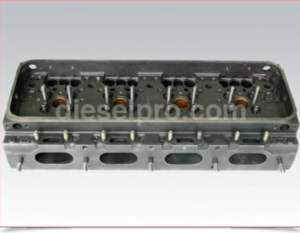
Cylinder Head for Detroit Diesel 8V92
- Water Pumps: Durable raw water and freshwater pumps for optimal cooling.
![Water Pump for Detroit Diesel 6V92 and 8V92[Right Hand]](http://dieselpro.com/blog/content/uploads/2024/11/Screenshot-2025-02-19-052453-300x228.png)
Water Pump for Detroit Diesel 6V92 and 8V92[Right Hand]
- Injectors: Precision-engineered injectors for efficient fuel delivery.
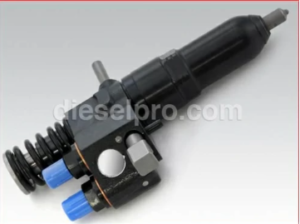
Detroit Diesel Injector for 8V92 Non- turbo
- Fuel Pumps: Reliable fuel pumps for consistent performance.
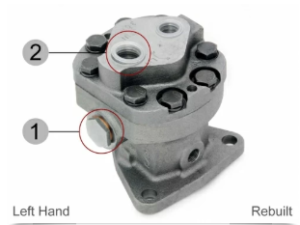
Detroit Diesel Fuel Pump – Left-Hand
- Gasket and Seal Kits: Comprehensive kits to ensure leak-free operation.
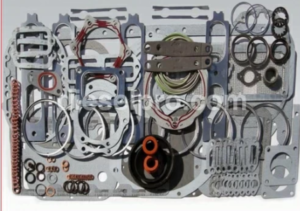
Overhaul gasket kit for engine 8V92
- Exhaust Manifolds: Sturdy replacements to improve exhaust flow.

Marine Exhaust Manifold For Detroit Diesel 8V92 & 16V92 Engines
- Blower Assemblies: Optimized blowers to maximize air intake.

Blower For Detroit Diesel 8V92
Available Aftermarket Parts for Turbocharged and Intercooled 8V92 Engines:
- Rebuild Kits: Turbo-specific and intercooled kits designed for high-performance configurations.
- Turbochargers: High-efficiency turbochargers to enhance power and fuel economy.

Turbocharger For Detroit Diesel 8V92
- Intercoolers: Aftermarket intercoolers to optimize air temperature and combustion efficiency.

Intercooler for 8V92 Detroit Diesel Marine Engine – Rebuilt
- Water Pumps: Specialized cooling pumps for turbo and intercooled systems.
- Injectors: Turbo-rated injectors designed for high-pressure systems.

Injector for 8V92 Detroit Diesel engine
- Fuel Pumps: Heavy-duty fuel pumps compatible with turbocharged engines.
- Gasket and Seal Kits: Turbo-specific kits for maintaining leak-free operation in high-pressure environments.
- Exhaust Manifolds: Reinforced manifolds for handling increased exhaust flow.
- Blower Assemblies: Blowers designed for turbocharged and intercooled configurations to ensure efficient air intake.
These parts are easily accessible, making it simple for operators to maintain or rebuild their 8V92 engines efficiently. For more information or to place an order, visit:
- Detroit Diesel 8V92 Engine Parts (Non-Turbo)
- Detroit Diesel 8V92 Turbocharged Engine Parts
- See our Parts Catalog for Detroit Diesel Engines
Conclusion
The Detroit Diesel 8V92 marine engine remains a legend in the maritime world due to its adaptability, power, and reliability. With configurations ranging from non-turbo to turbo-aftercooled, the 8V92 has proven itself in a wide array of marine applications, including fishing vessels, tugboats, and recreational yachts.
Today, the 8V92 continues to thrive, supported by a robust aftermarket network that ensures these engines remain operational for years to come. For operators seeking a time-tested engine with unmatched versatility, the 8V92 remains an exceptional choice.
For premium aftermarket parts and expert advice, trust Diesel Pro Power to keep your 8V92 running at peak performance.
FAQ Section
Q: What is the difference between intercooled and aftercooled models?
A: Intercooled models use an intercooler to reduce the temperature of compressed air entering the combustion chamber, while aftercooled models cool the air further after it exits the turbocharger, providing enhanced efficiency and power.
Q: Can the 8V92 still compete with modern engines?
A: Yes, its proven durability and cost-effective maintenance make it a viable option, especially when paired with high-quality aftermarket parts.
Q: Are parts for the Detroit Diesel 8V92 still available?
A: Yes, Diesel Pro Power offers an extensive range of premium aftermarket parts for both non-turbo and turbocharged 8V92 engines.
Q: What are the signs that my 8V92 engine needs a rebuild?
A: Common signs include excessive smoke, reduced power, increased oil consumption, and difficulty starting. Regular inspections can help detect issues early.
Q: What is the expected lifespan of a Detroit Diesel 8V92 engine?
A: With proper maintenance and timely rebuilds, the 8V92 engine can last several decades, depending on usage and operating conditions.



 Free US Calls: 1-888-433-4735
Free US Calls: 1-888-433-4735 International: 305-545-5588
International: 305-545-5588
I have two marine 8v92 Detroit twin turbo engines on my boat and I don’t know where all the anodes are. Is this something you can help me with?